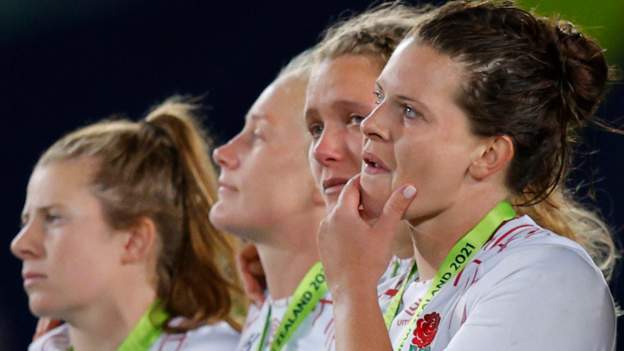
I had my boys screaming at the television next to me, but as the World Cup final reached its finale, I was getting flashbacks.
2001. Sydney. The third and deciding Test of the British and Irish Lions tour of Australia in 2001.
On that occasion, we were six points down, 81 minutes on the clock, Johnny Wilkinson kicked a penalty to the corner to set up an attacking line-out, It was seven metres or so out.
We called a front ball to Martin Johnson. That was our banker ball, but Justin Harrison got up to steal and that was the series gone.
More than twenty years on, Eden Park felt so similar.
England had been super secure in their line-out and line-out drive up until the final play. They had completed 16 of their previous 17 line-outs to that point.
If they had brought another to ground, it seemed certain they would fire up the maul, go over for a try and win the trophy.
But New Zealand's replacement Joanah Ngan-Woo got up just in front of Abbie Ward and managed to win that momentary arm wrestle. She stole the ball and sealed the game for the Black Ferns.
New Zealand gambled at the right time. They could have stayed on the floor to try and resist the coming drive, but they went up and it paid off. It was a moment of brilliance.
It sums up the slender margins that top-level sport and the best finals come down to.
The game wasn't an advert for women's rugby - it was an example for any team at any level, of any gender, how to play the game.
The speed, the skills, the physicality, the clear thinking in adversity, the contrasting tactical plans - all of it was at the highest level.
There are always going to be cynics who will challenge the quality of what they are watching when it comes to women's sport, but it was the highest quality, high-octane rugby.
I don't care who you are, what sport you like, if you were watching that, you couldn't take your eyes off it.
The result was heart-breaking for England. There is no getting around that.
Given their record of 30 successive wins, given the expectations that they came with, coach Simon Middleton was honest and accurate when he said before the tournament that anything less than lifting the trophy would be failure.
Before the match, they would have seen the atmosphere in Eden Park and the home support, but still been confident.
When it was 14-0 after 15 minutes they would have been even more so.
But going down to 14 players switched the whole mood. Lydia Thompson's red card changed it into a battle, it brought some real adversity for England and real belief for New Zealand.
There can be no complaints about the dismissal. There was no malice in it, but it was head to head and those are the rules.
The only comeback that England might have was Kennedy Simon's yellow in the second half. Referee Hollie Davidson ruled that her tackle on Abby Dow had impacted on the shoulder and slipped up to the head, so was only a sin-binning. That was a close call.
Still England played nearly 65 minutes with only 14 players and, for some periods of play, it looked like they had 16. They could easily have won that game.
I had Wayne Smith as a coach at Northampton and when I heard he was coming in to work with them after those two Test defeats in England last autumn, I knew they would turn into a very different side.
He is clever tactically, skilled at motivating players and together that is a powerful combination.
New Zealand's execution and endeavour from deep was superb. It was the sort of style of play to make you fall in love with the game all over again.
Lucy Packer was brought into the England line-up at the last minute at scrum-half. Any change in such a key position can be disruptive, but I thought Packer did really well. She slotted in seamlessly for the injured Leanne Infante, her service to Zoe Harrison was sharp and slick.
I think Infante's injury told more actually when Claudia MacDonald, who isn't a specialist, came into the role in the final 30 minutes. I think England lost a little connection there.
The bench for New Zealand was outstanding, however.
Krystal Murray came on and ploughed over for the score that put them ahead for the first time in the match. Losing Portia Woodman with a head blow in that red-card incident was a setback, but Ayesa Leti-l'iga was superb with her two tries. Her footwork and speed was exceptional.
Kendra Cocksedge was excellent at scrum-half in her final game, while Theresa Fitzpatrick and Stacey Fluhler in the centres were so deft and graceful in their movement, on and off the ball, and caused England a lot of trouble.
The possibilities will whirl around in the minds of Middleton and his players after a defeat like that, what they could or should have done, but I really want the England players to know how sensational they have been as a team, how inspirational they have been as individuals.
Plenty of those girls will be around for the next World Cup in 2025 on home soil. They and we should start looking forward to it already.















 Phone: (800) 737. 6040
Phone: (800) 737. 6040 Fax: (800) 825 5558
Fax: (800) 825 5558 Website:
Website:  Email:
Email: 






